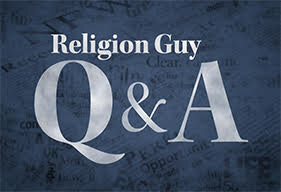THE QUESTION (as raised by The New York Times):
What can we know about biblical figures, for instance Joshua?
THE ANSWER:
How do we know what we know, or think we know, or can know, or might know?
“Epistemology” is the branch of philosophy that ponders such matters. It may seem odd, but philosophers even ponder if there’s any basis for believing that anything we remember from before one second ago actually happened!
Back to earth, how do we assess what can be known about people and events from long ago that we ourselves did not witness? One approach is the ideology known as “logical positivism,’ which rules out supernatural claims in advance by definition and thus wipes out many assertions by the great world religions. That’s a simple method, but other philosophers say it’s far too simple.
Well, then, what can we know about the past, whether religious or not? The answer is almost entirely written records that have been passed down to us. This is obviously central with the biblical faiths of Judaism and Christianity, which center heavily upon historical narratives.
Which is why The Religion Guy continues to ponder eight words The New York Times found fit to print in a recent feature about Muslims in Iraq tending what they believe is the tomb of Joshua. Israelis say instead that the ancient patriarch is buried 20 miles north of Jerusalem.
Both claimed locations invite skepticism. But the influential newspaper went much further, informing readers: “There is no historical evidence Joshua actually existed.”
This is not a particularly prudent thing to say in the Muslim world, where Joshua is revered as an actual prophet of God in the line that culminated with the Prophet Muhammad, had no doubt Joshua existed, this according to authoritative hadith texts. Joshua is also referred to in the Quran, though not by name (18:60). The earlier Jewish and Christian Scriptures depict Joshua as an actual person.
In effect, the Times writer and copy editors tell us the Jewish Bible contains nothing that should count as historical evidence. Think about that. Liberal university professors will often teach that a particular Bible section has flawed evidence, or mixes fact with myth, or even is pure fiction. But they do not dismiss all evidence that the Bible records.
There’s good intellectual reason for an open mind on this if we apply the same criteria to non-religious history. In fairness, erasure of the Bible also removes from consideration all ancient writings from across the centuries, meaning we know virtually nothing about Greeks like Alexander, Archimedes, Aristophanes, or Aristotle, or Romans like Caesar, Cicero, Claudius or Cleopatra — or religious figures like Muhammad, Jesus, Zoroaster or Joshua.
Admittedly, we’re on sounder footing with Jesus than Joshua. Thousands of ancient New Testament texts and fragments are available to evaluate, along with some non-biblical mentions. Further, experts’ consensus says the time gap from Jesus’ career to the composition of Gospels we read today was roughly a half-century or so (leaving aside earlier oral or written accounts Gospel writers may have drawn from). That’s like journalists and historians in 2021 researching e.g. the third moon walk, Kent State shootings, Vietnam-era Pentagon Papers, Watergate, or the opening of Disney World — with many eyewitnesses still alive.
Related aside: As a journalist, The Guy asks himself when radical scholars tell us Jesus didn’t say much of what he said (to quote Yogi Berra): If not Jesus, then who was the genius who was rapidly forgotten yet left behind sayings still discussed 2,000 years later?
Turning to The New York Times and its disappearing Joshua, let’s briefly unpack what we might know about Moses’ celebrated aide and successor who (purportedly?) led Israel into the Promised Land.
CONTINUE READING: “What can we know about long-ago biblical figures like Joshua?”, by Richard Ostling.
FIRST IMAGE: Orthodox icon from the Uncut Mountain Supply website.


